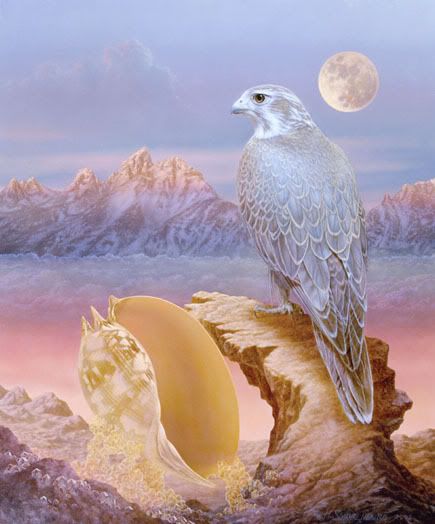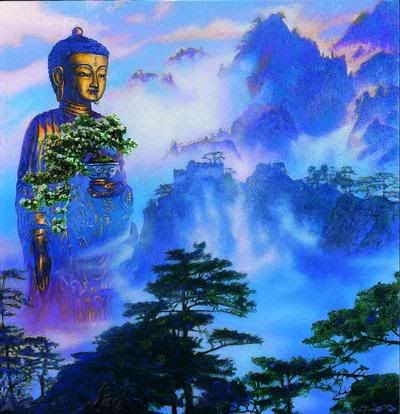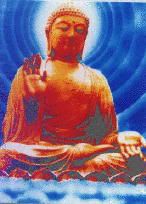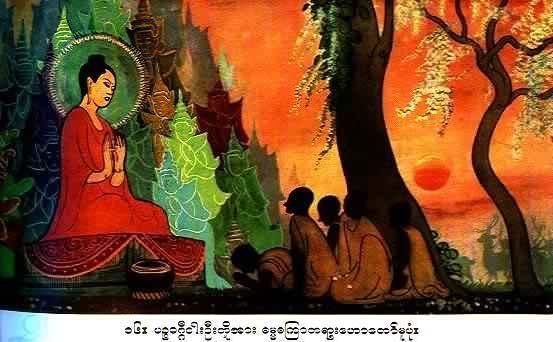
TRANSCENDING MADNESS
by
Chogyam Trungpa
The Bardo of Meditation
I. Bardo
There seems to be quite a misconception as to the idea of bardo,
which is that it is purely connected with the death and after-death experience.
But the experience of the six bardos is not concerned with the future alone;
it also concerns the present moment. Every step of experience, every step of life,
is bardo experience.
Bardo is a Tibetan word: bar means "in between" or,
you could say, "no-man’s land," and do is like a tower or an island in that no-man’s
land. It’s like a flowing river which belongs neither to the other shore nor to this shore,
but there is a little island in the middle, in between. In other words, it is present
experience, the immediate experience of nowness where you are, where you’re at.
That is the basic idea of bardo.
The experience of such a thing also brings the idea of space,
of course. Without seeing the spacious quality, which does not belong
to you or others, you would not be able to see the little island in the middle at all.
The living experience of bardo could only come from seeing the background
of space. And from that, within space or an understanding of space,
a brilliant spark or flash happens. So generally, all bardo experiences
are situations in which we have emerged from the past and we have not yet
formulated the future, but strangely enough, we happen to be somewhere.
We are standing on some ground, which is very mysterious. Nobody knows
how we happen to be there.
That mysterious ground, which belongs to neither that nor this,
is the actual experience of bardo. It is very closely associated
with the practice of meditation. In fact, it is the meditation experience.
That is why I decided to introduce this subject. It is also connected
with the subject of basic ego and one’s experience of ego, including
all sorts of journeys through the six realms of the world.
Beyond that is the issue of how we happen to be in the six realms
of the world; how we find that experience is not seen as an evolutionary process,
as it should be, but as extremely patchy and rugged, purely a glimpse. Somehow,
things don’t seem to be associated or connected with each other, they are very
choppy and potent like gigantic boulders put together. Each experience is real, potent,
impressionable, but generally we don’t find that there is any link between those potent
experiences. It is like going through air pockets emotionally, spiritually, domestically,
politically. The human situation passes through these highlights or dramas, and on the
other hand, the absence of drama, and boredom which is another aspect of drama.
We go through all these processes. And somehow these isolated situations,
which from our confused way of thinking seem to have nothing to do with
the basic quality of continuity, are the continuity itself. So the only way
to approach this is to see the evolutionary process.

I can’t lay heavy trips on people to understand that or accept
that purely on blind faith. In order not to lay heavy trips on people,
we have to have some concrete thing to work on. That is where the
six experiences of bardo come through in each moment, each situation.
Each of the six types of bardo is individual and unique in its own way.
They are isolated situations on the one hand, but on the other hand they
have developed and begun to make an impression on us, penetrating us
within that basic space or basic psychological background. So the bardo
experience is very important to know. And in fact it is much more fundamental
than simply talking about death and reincarnation and what you are supposed
to experience after you die. It is more fundamental than that.
I know people would love to hear about undiscovered areas:
"Do Martians exist?" In a lot of cases, when we talk about karma and reincarnation
and life after death, we tend to make assumptions or logical ideas about them.
And people often get quite emotional about it, because they would like to prove
that there are such things as life after death or reincarnation. But the subject
we are going to work on is not based on trying to prove logical conclusions.
I mean, it is not really that desperate, is it? What difference does it really make
whether we are going to come back or not? The question of whether we are what
we are or whether we are on some ground seems to be more realistic and more important.
In discussing the experience of the bardos we are working on that
realistic aspect of the process of changing from birth to death, the intermediate
process between birth and death. We are not trying to prove logically or by theology
that life after death is important and that you must accept that on faith. In many
cases, particularly in the West, people try to prove the existence of life after death,
saying: "Such and such a saint or sage was a great person when he lived,
and his example of being is beyond question and he also says that there is such a
thing as life after death." That is trying to prove the notion of life after death by
innuendo: "It is true because he was an enlightened person as a living being
and he said so!" When we try to prove the point of view of life after death in that way,
we have no real proof. The only thing we could prove is that he was an awake person
and that he said so.
There is almost a feeling of rediscovery:
Eastern traditions have managed to present to the Western world
that nothing is fatalistic but everything is continuously growing,
as an evolutionary, developing process. In many cases, Westerners
find this view extremely helpful and hopeful. They no longer just wait to die,
but there’s something hopeful in the message of continuity, that you have another
chance. But I think all of these views and attitudes on the idea of rebirth and
reincarnation and karma are very simple-minded ones. As well as that,
we begin to feel we can afford to make mistakes, because surely we will
have another chance. We are going to come back and we might do better.
Often people who are afraid of dying have been saved by hearing the idea of
reincarnation. They are no longer afraid of death, or even if they are afraid of death,
they try to contemplate the idea of rebirth, which saves them from that.
I don’t think that is a complete way of looking into the situation.

The fatalistic quality of life and death depends on the present situation.
The present situation is important, that’s the whole point, the important point.
Whether you continue or whether you don’t continue, you are what you are at the
moment. When we begin to sit down and meditate, these collections do come up.
Discursive thoughts, argumentative thoughts, self-denial thoughts, all sorts of thoughts
begin to come up. So it seems to be important to know something about them.
In other words, you could make use of these thoughts instead of pretending to be good
and trying to suppress thoughts, as though you don’t require them anymore or they
don’t require you anymore.
It is good to make use of speculative mind.
That is exactly why the whole idea of studying scriptures and going through disciplines
or practices is extremely important. It is a way of using these living materials that
we have. Whether we try to quiet ourselves or not, these things come up constantly
and do happen. Therefore, making use of such thought processes as a way of learning
is extremely necessary and good and helpful and important unless you develop
"gold fever," believing that you have found some argument, some logic which you’re
excited about, and you spend the rest of your life arguing, trying to prove it logically
all the time. If this begins to happen, then the intellect is not being properly cared for.
It begins to take on a self-destructive quality, as in gold fever, where you’re
constantly willing to sacrifice your life looking for gold, gold, gold, and you end up
destroying yourself. It is the same thing when you’re trying to look for something,
trying to prove something purely by intellectual speculation, beyond the ordinary level
of thought process. The ordinary level of thought process has been transformed
into a more ambitious one. Being able to click with your thought process and work
something out is good, but beyond that goodness, you begin to get a faint idea of
satisfaction, just a teeny-weeny bit to start with and then it begins to grow, grow,
grow, and grow. It becomes addictive and self-destructive.
So that seems to be the limitation. If one’s experiences, discoveries,
and intellectual understandings coincide simultaneously, like putting together
a jigsaw puzzle, that’s fine. That doesn’t mean that you have to have an absolute
understanding or a complete command of the whole thing necessarily at all.
But you could have a basic glimpse or understanding of the situation and you could
go along with it, without indulging in the experience as a new discovery of an exciting
thing. And I hope, in any case, to introduce in my lifetime, working with people in the
West, all the teachings that are available and have been studied, practiced, and
experienced in Tibet and elsewhere. And I have tremendous confidence that people
in the West will be able to grasp them if we are not too rushed, if no one has caught
gold fever halfway. That would be too bad.
I’m sure that such studying,
such learning, means sacrificing intellect when it goes beyond, to the pleasurable point
of intellectualization. It also means sacrificing the emotional, impulsive quality of
wanting to exaggerate by tuning in to your basic neuroses and trying to interpret
them as discoveries. That is another problem. You see, there are two extremes:
one extreme is indulgence in the intellectual sense and in intellectual discovery;
the other extreme is using the impulsive, instinctive level of the ego as camouflage
to prove your state of mind in terms of the teachings. The two of them could work
side by side with some people, or else there could be a greater portion of one
or the other with others. It could work either way.
Our task is not purely trying to save ourselves alone, whether you are 99 years old
or whether you are ten years old doesn’t make any difference.
Our task is to see our situation along with that of our fellow human beings.
As we work on ourselves, then we continuously work with others as well.
That is the only way of developing ourselves, and that is the only way of relating
with the six experiences of bardo. If we relate our experience with the dream bardo,
the bardo between birth and death, the bardo of the before-death experience,
or the bardo of emotions, all of these have a tremendous connection with our
projection of the world outside. Other persons, animate and inanimate objects,
the apparent phenomenal world, also play a great and important part.
But unless we’re willing to give in, give way, and learn from these situations,
then our prefabricated learning, either by scripture or by the constant close watch
of our instructor, doesn’t help. It doesn’t mean anything very much.

{all images linked}




